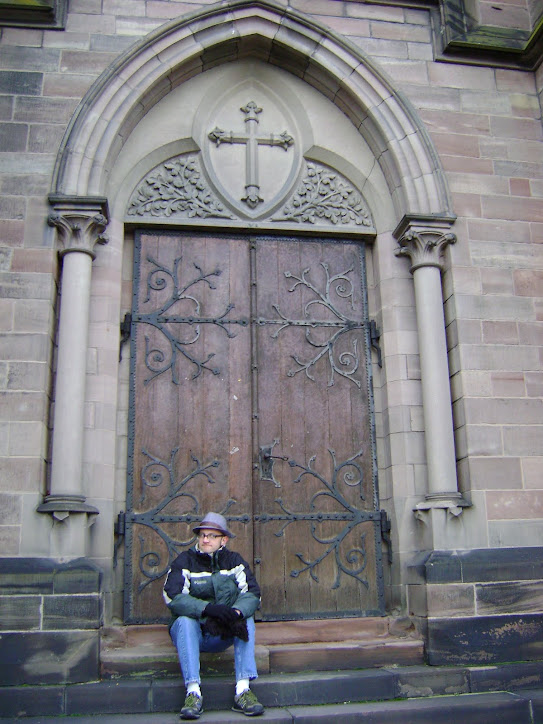http://www.pbs.org/wgbh/nova/tech/shabbat-elevator.html
For those of you too busy to watch a little under 3 minutes of video, it's basically a story about how some rabbi some time around the advent of the modern era defined electricity as "lighting a fire" and therefore "work" on the sabbath, and so many observant Jews don't operate electric things from Friday night sundown (sundown is the start of the Jewish day) until Saturday night sundown in order to keep a the Sabbath. But what do you do if you live on the 15th floor? Hence, sabbath elevators that are programmed to stop on every floor.
Why is the sabbath such a big deal to Jewish people? At times, it really seems like more work to keep it than it would be to just push an elevator button. What's the big deal? Why all the fuss? Why is it in the top 10 along with "no adultery" and "no murder?"
"Far from idleness being the root of all evil, it is rather the only true good."--Søren Kierkegaard
If you look at the Ten Commandments in Deuteronomy 5 (the reasoning is slightly different from Exodus 20) there's an interesting comment on this:
Remember that you were slaves in Egypt and that the Lord your God brought you out of there with a mighty hand and an outstretched arm. Therefore the Lord your God has commanded you to observe the Sabbath day.I've never been a slave, but I have struggled not to be a work-a-holic, and I think they have some striking similarities. When you need to work to feel significant or for your life to have value, then the way you spend your time (which adds up to be the way you spend your life) isn't really up to you, is it? It's up to the job. Or the boss, or the company, or the church, or the people in your employ. All the while your soul is dying the death of a thousand tiny paper cuts completely unaware. Then you look up and realize you hate your life, and you deserve it.
But God would spare us that pain. He commands us to go a different way. We were never created for slavery, but for His pleasure, and because He is good, our own. We were made for shalom--for peace, joy, and life in abundance. But we don't want it. We want to do things our own way. We want to earn our worth and our happiness, and it fails every time.
It's not like there isn't work to be done, or that all work is bad. In fact, if you read the story, Adam was a very busy farmer/biologist before he met Eve, and presumably for the time he spent with her before the fall. Work is a gloriously good thing. But like any good thing, without God, it becomes a curse.
So, we're in the process of moving across the country to plant a church (great activity for a guy who struggles with being a work-a-holic right?). Through a strange sequence of events, we found ourselves with a "month of limbo" in which we couldn't stay in our old place or move into the new place. The plan was for me to go out and stay with friends and look for a job while Kara hung back and took care of Bolt and spent some time with her folks. Then the day before I would have left to drive across the country, Kara got a great job with benefits! So she went out to start working, and I stayed behind with the baby. At first I had to mourn the loss of an adventure and the challenge of job hunting all by my self in the big city. I'm sure finding the job all on my own and all the things I could have accomplished would have made me feel invincible--a very dangerous place to be, especially when attempting to live for Jesus. But God arranged things so I was forced to hang back and bond with my son, read books, mooch off my parents, and do a lot of nothing.
It took some time getting used to. I have been working 50+ hours/week for most of the last 7 years. I actually prefer to be about that busy or I don't feel like I'm getting anything done. Meanwhile my poor wife is out in the big city all alone, without her baby. But this was the growth we both needed. Kara's been stretched, and we've missed each other and appreciated each other in ways we weren't previously aware of. I've been challenged to see the quality of life I would settle for vs. the kind of life my loving Father offers. Spending a lot of time playing with Bolt, I've had to meditate on how needy he is and how much I want to care for his needs, and how much I like him. I've had to see how much he needs me (and his mom) and how much I need God. I've seen how oblivious he is to my plans to one day not change his diapers and how liberating that will be for him, even though he obviously can't conceive of such a thing. I so love it when he giggles. He's even cute when he cries. I'm watching him change and grow up before my eyes and realizing how short and important the time is that we have together. I'm realizing that I'm called to be a good father, that the desire to protect, instruct, & equip my son with the skills and values he'll need in adulthood is not merely an evolutionary impulse built into us for the survival of the species, but something God desires for me to experience so that I and Bolt can get ready to spend eternity with Him. I've drank a lot of beer and wine around a fire pit with my dad, and we've shared stories of football, and ministry, and mischief. I've had time to experience the blessing that this life is and what it can be, and I'm inspired to give to my son what I've received from my dad and my Heavenly Dad. And some other really great stuff I haven't processed yet.
I'm sure that sleeping on a bunch of dudes' couches would have been fun, particularly because I like all the hospitable people I was going to stay with, but I'm positive that it wouldn't have been all that. Some things you just can't get through working. In fact I think all of the really important stuff we gain in this life is a gift that literally, according to definition, can not be earned. Things like faith, hope, love. These are the things Jesus intends to give us and that we can't fully appreciate without taking a break from our toilsome labor.
And that's why rest isn't optional.
















